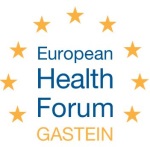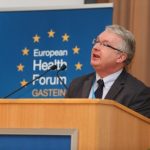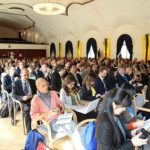 The end of 2015 is slowly approaching, and it surely has been a memorable year, both for European politics in general and for healthcare politics on a national and international level. The predominant topic on policy-makers’ agendas, especially during the last months, has been the refugee crisis.
The end of 2015 is slowly approaching, and it surely has been a memorable year, both for European politics in general and for healthcare politics on a national and international level. The predominant topic on policy-makers’ agendas, especially during the last months, has been the refugee crisis.
The challenges it implies are cutting across sectors and will accompany us into the new year and beyond. It was thus an obvious choice to feature as the defining topic of the Opening Plenary to the European Health Forum Gastein 2015. Like Martin Seychell, DG SANTE, European Commission, and other panellists reiterated during the Plenary: Migration is a key feature of the 21st century. All the more important it is that we find a European way of handling the current situation, also with regard to healthcare provision. We need more than a quick fix, we need a long-term strategy that is sustainable and comprehensive.
Martin McKee, London School of Hygiene and Tropical Medicine, stressed that we need to abandon common misbeliefs about the health status of those people fleeing to Europe in order to pave the way for such a strategy. A potential threat refugees are posing to EU citizens, e.g. with regard to the spread of infectious diseases, is miniscule (for further information you can also view ECDC’s rapid risk assessment on communicable disease risks associated with the movement of refugees in Europe during the winter season). Their main health issues are brought on by the passageways they are taking to enter the European Union and by the very causes they are seeking to escape – war and civil conflict. Therefore, one of the main healthcare needs we should be prepared to address are mental health issues. And European health systems are strong.
A powerful statement was contributed by Meinie Nicolai, President of Médecins Sans Frontières, Belgium: “This is not a refugee crisis, this is a reception crisis.” Needs are being created by European policies, instead of being solved. An example she gave was the difficulties many are facing when trying to gain access to healthcare without the documents required by current EU regulations. Related to this is an observation by Santino Severoni, WHO Regional Office for Europe: two thirds of EU member states offer only emergency care to those without refugee status. Offering primary healthcare, and thus pre-empting a number of different disease patterns, would be a much more economic route to take. Also, simply “offering” is not enough: Christopher Fearne, Parliamentary Secretary for Health, Malta, stated clearly that a key aspect we need to include into all strategic considerations is how to make healthcare truly accessible.
Intercultural and language barriers are not easy to overcome; it will be crucial to think beyond the emergency response and embrace proper integration. Constantinos Manolopoulos, European Union Agency for Fundamental Rights (FRA), agreed and added that we should also be aware of the potential benefits a predominantly young migrant population can have for Europe: This is more than a challenge, this is an opportunity.
Main messages of the Plenary:
- When dealing with the crisis, key EU values should be remembered;
- Voters have been ahead of politicians, welcoming migrants and offering help;
- This is a reception crisis, not a refugee crisis, and the EU was not prepared for it;
- Solidarity between Eastern and Western Europeans should be ensured and Europe’s response should be a coordinated one;
- We need an EU network of interpreters, intercultural mediators and psychologists to help overcome cultural barriers, and a fast mechanism to fund these initiatives;
- Migration is a global issue but the EU should lead by example in terms of how to manage it;
- Access to health care services should not be dependent on a migrant’s status;
- Access to health care pays off also economically in the long term;
- Communicating with other policy areas is difficult but manageable
Further information:
Interview with Helmut Brand, President, International Forum Gastein, on the healthcare needs of migrants and refugees (German): http://www.ehfg.org/fileadmin/Press/Releases/Kurier_Fluechtlinge_Gesundheit_DE.pdf
Thematic short movie clips on the EHFG 2015 and Gastein Health Outcomes 2015: http://www.ehfg.org/conference.html
SAVE THE DATE
19th EHFG
28th – 30th September 2016
Bad Hofgastein, Austria
Tip: More up to date educational events can be found online in the Education Database »medicine & health«.



